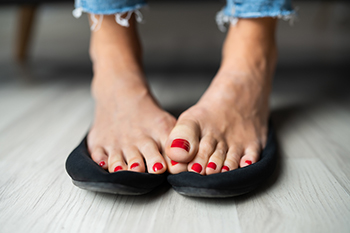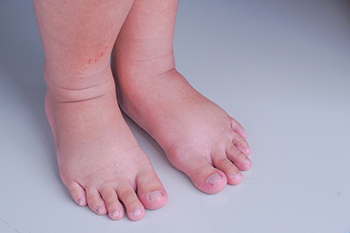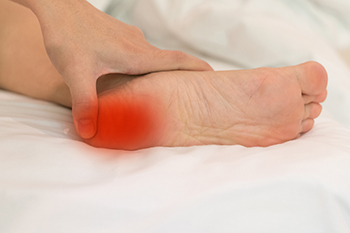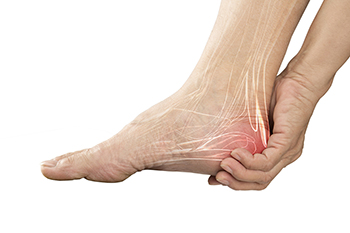159 North 3rd Street
Macclenny, Florida 32063

If you are exercising a lot, or the weather is very hot, your feet may perspire more than normal. But if you find that your feet sweat for no particular reason when you are at rest, you may have a condition known as plantar hyperhidrosis. Although the cause of hyperhidrosis is still unknown, medical experts have determined that the brain signals to the sweat glands that your body is overheating. As a result, the sweat glands in several parts of the body, including the soles of your feet, work overtime to regulate your body temperature. It is not known how to eliminate hyperhidrosis completely, but a number of temporary measures can keep it controlled. Treatment options, which vary with the severity of the condition, include topical gels or lotions, injections, and oral medication. Another treatment option is iontophoresis, which involves sending a mild electrical current through a foot bath to temporarily shut down the sweat glands in the feet. For guidance on which treatment options are best for you, a visit with a podiatrist is suggested.
If you are suffering from hyperhidrosis contact Dr. John L. Coleman of Florida. Our doctor can provide the care you need to attend to all of your foot and ankle needs.
Hyperhidrosis of the Feet
Hyperhidrosis is a rare disorder that can cause people to have excessive sweating of their feet. This can usually occur all on its own without rigorous activity involved. People who suffer from hyperhidrosis may also experience sweaty palms.
Although it is said that sweating is a healthy process meant to cool down the body temperature and to maintain a proper internal temperature, hyperhidrosis may prove to be a huge hindrance on a person’s everyday life.
Plantar hyperhidrosis is considered to be the main form of hyperhidrosis. Secondary hyperhidrosis can refer to sweating that occurs in areas other than the feet or hands and armpits. Often this may be a sign of it being related to another medical condition such as menopause, hyperthyroidism and even Parkinson’s disease.
In order to alleviate this condition, it is important to see your doctor so that they may prescribe the necessary medications so that you can begin to live a normal life again. If this is left untreated, it is said that it will persist throughout an individual’s life.
A last resort approach would be surgery, but it is best to speak with your doctor to find out what may be the best treatment for you.
If you have any questions please feel free to contact our office located in Macclenny, FL . We offer the newest diagnostic and treatment technologies for all your foot and ankle needs.

Many people use the term “cankle” to describe their swollen calves and ankles, despite the fact that this is not a true medical term. It is the area where the calf and ankle connect and it may be hard to tell the difference between the two. Existing medical conditions may cause the ankles to swell excessively, including congestive heart failure, cellulitis, and pregnant women may experience preeclampsia. Additionally, sitting for extended periods of time may cause the blood to pool in the ankles and the warmer temperatures may cause swollen ankles. Some patients go through hormonal changes or may be taking certain medications that may lead to swollen ankles. When medical issues are ruled out, many people would like to know how swelling can be reduced in the ankles. This can consist of eating foods that have reduced saturated fat and sodium, in addition to increasing exercise. Walking is suggested for patients with ankle swelling as this can help to improve circulation in the legs. If you have swollen feet or ankles, please speak with a podiatrist who can guide you toward proper treatment options.
Swollen feet can be a sign of an underlying condition. If you have any concerns, contact Dr. John L. Coleman of Florida. Our doctor can provide the care you need to keep you pain-free and on your feet.
Swollen feet are a common ailment among pregnant women and people who stand or sit for extended periods. Aging may increase the possibility of swollen feet and patients who are obese often notice when their feet are swelling too. There may be medical reasons why swollen feet occur:
Swollen feet can also be caused by bone and tendon conditions, including fractures, arthritis, and tendinitis. Additionally, there may be skin and toenail conditions and an infection may cause the feet to swell. Patients who take medicine to treat high blood pressure may be prone to getting swollen feet.
Many patients elevate their feet to help relieve the swelling and this is generally a temporary remedy. When a podiatrist is consulted the reason behind the swelling can be uncovered and subsequently treated.
If you have any questions please feel free to contact our office located in Macclenny, FL . We offer the newest diagnostic tools and technology to treat your foot and ankle needs.

There are many patients who experience heel pain for various reasons. Some of these are obesity, plantar fasciitis, Sever’s disease, or wearing shoes that do not fit properly. Heel spurs, bony protrusions that form on the bottom of the heel, are a common cause of heel pain. Patients who may be at an increased risk for developing heel pain include those who are physically active, pregnant women, and the middle-aged population. Mild relief may be found from heel pain when specific stretches are practiced frequently. These include standing on a step and lowering the heels one at a time until a gentle stretch is felt. Additionally, improving posture and walking style may aid in relieving heel pain. If you have this heel pain for any reason, please consult with a podiatrist who can effectively diagnose and treat it.
Many people suffer from bouts of heel pain. For more information, contact Dr. John L. Coleman of Florida. Our doctor can provide the care you need to keep you pain-free and on your feet.
Causes of Heel Pain
Heel pain is often associated with plantar fasciitis. The plantar fascia is a band of tissues that extends along the bottom of the foot. A rip or tear in this ligament can cause inflammation of the tissue.
Achilles tendonitis is another cause of heel pain. Inflammation of the Achilles tendon will cause pain from fractures and muscle tearing. Lack of flexibility is also another symptom.
Heel spurs are another cause of pain. When the tissues of the plantar fascia undergo a great deal of stress, it can lead to ligament separation from the heel bone, causing heel spurs.
Why Might Heel Pain Occur?
Treatments
Heel pain should be treated as soon as possible for immediate results. Keeping your feet in a stress-free environment will help. If you suffer from Achilles tendonitis or plantar fasciitis, applying ice will reduce the swelling. Stretching before an exercise like running will help the muscles. Using all these tips will help make heel pain a condition of the past.
If you have any questions please contact our office located in Macclenny, FL . We offer the newest diagnostic and treatment technologies for all your foot and ankle needs.

Many people over age 65 develop foot problems. One of the most common of these problems is plantar fasciitis, which causes pain in the heel of the foot. Plantar fasciitis is when the band of connective tissue running from the heel to the toes on the sole of the foot is overstretched or micro tears occur. Prevention of plantar fasciitis includes improving posture and walking properly, stretching the calves and ankles regularly, wearing shoes that fit well, and rolling tennis balls or frozen water bottles under the feet while sitting down to stretch and stimulate the bottoms of the feet. If you are a senior who continues to have heel pain or a caregiver of a senior complaining of such pain, see a podiatrist who can properly diagnose the condition and provide appropriate treatment.
Proper foot care is something many older adults forget to consider. If you have any concerns about your feet and ankles, contact Dr. John L. Coleman from Florida. Our doctor can provide the care you need to keep you pain-free and on your feet.
The Elderly and Their Feet
As we age we start to notice many changes in our body, but the elder population may not notice them right away. Medical conditions may prevent the elderly to take notice of their foot health right away. Poor vision is a lead contributor to not taking action for the elderly.
Common Conditions
Susceptible Infections
Diabetes and poor circulation can cause general loss of sensitivity over the years, turning a simple cut into a serious issue.
If you have any questions please feel free to contact our office located in Macclenny, FL . We offer the newest diagnostic and treatment technologies for all your foot and ankle needs.